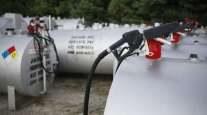Diesel Declines to $3.749 as Fuel Demand Weakens
This story appears in the Oct. 10 print edition of Transport Topics.
The average price of retail diesel declined 3.7 cents to $3.749 a gallon, its lowest level since February, the Department of Energy reported.
Last week marked the fourth straight decline for commercial trucking’s main fuel totaling 11.9 cents, leaving the average at the lowest point since Feb. 28, when it was $3.716 a gallon, DOE said after its Oct. 3 survey of fueling stations.
Despite the recent declines, diesel is still 74.9 cents higher that it was a year earlier.
DOE also reported that the retail average price for gasoline dropped 7.6 cents to $3.433 a gallon. The price of gasoline has fallen 24.1 cents in the past month, but is still 70.1 cents higher than it was during the comparable week in 2010.
Analysts have a simple reason for the price drops.
“The economy is in the toilet,” said Stephen Schork, principal in Villanova, Pa., oil trader Schork Group Inc. He said there is fairly weak demand for motor fuels right now, which is pushing prices down.
Schork explained that gasoline prices have fallen faster because gas purchases constitute discretionary spending, as compared with diesel fuel.
The prices of both motor fuels are dropping in response to falling crude prices, noted Neil Gamson, an economist at DOE’s Energy Information Administration.
On Oct. 4, the price of crude oil hit a one-year low of $75.67 a barrel, before rebounding later in the week.
Even though it already orders drivers to keep speeds at 70 mph or less, refrain from idling and fill up only at stops where it has a contract, McCorkle Truck Line Inc. is taking more steps to save money on fuel.
The hauler of bulk materials has long been looking at purchasing auxiliary power units that would enable its drivers to run air conditioners, heaters and other devices while parked, said operations manager Steve Nettleingham.
“We wanted to wait and get a look at good battery-powered packs to see what they can do. You can use a diesel one, but those can get you in trouble in California,” he said.
APUs are used to save fuel and cut engine idling expenses. Battery-powered devices give off few emissions and their use can avoid fines for engine idling, particularly in California, where air-quality codes are more stringent, Nettleingham said.
Now, with McCorkle about to take delivery of a new tractor with an APU installed, “We’ll be able to get a good test out of one,” he said.
Jack Cooper Transport Co. is another carrier intent on cutting down on idling.
“We monitor our drivers daily, and if a driver records the worst idling performance in the fleet for three consecutive days, we notify him and work with him,” said Gregory Goodson, maintenance director for the Kansas City, Kan., auto hauler.
In addition to minimizing idling, the company emphasizes maintaining proper tire inflation, optimizing gear shifting and making sure vehicles are in good repair, he said.
Auto-hauling rigs have very high levels of aerodynamic drag, Goodson said at a September meeting in Raleigh, N.C., of the Technology & Maintenance Council. Therefore, Cooper must pursue other conservation techniques.
Although crude oil had closed at $75.67 a barrel on the New York Mercantile Exchange on Oct. 4, by the next day, prices were on the rise again and closed at $82.59 on Oct. 6. The increase came after the government reported a crude inventory drop and strong economic data, Bloomberg News reported.
Looking ahead, the end of 2011 and next year will likely bring significantly higher oil and diesel prices, said Tom Kloza, chief oil analyst for Oil Price Information Service. “Unfortunately, I do think there will be an attempt to get diesel to $5 during this next run,” he said Sept. 26 at the OPIS Fleet Fueling Conference.
Kloza also said, “Barring a serious collapse of economic markets” or another significant uprising in the Middle East, global economic growth would could force crude oil prices as high as $130 a barrel.
News Editor Neil Abt contributed from Las Vegas and Associate News Editor Jonathan S. Reiskin contributed from Raleigh, N.C.




